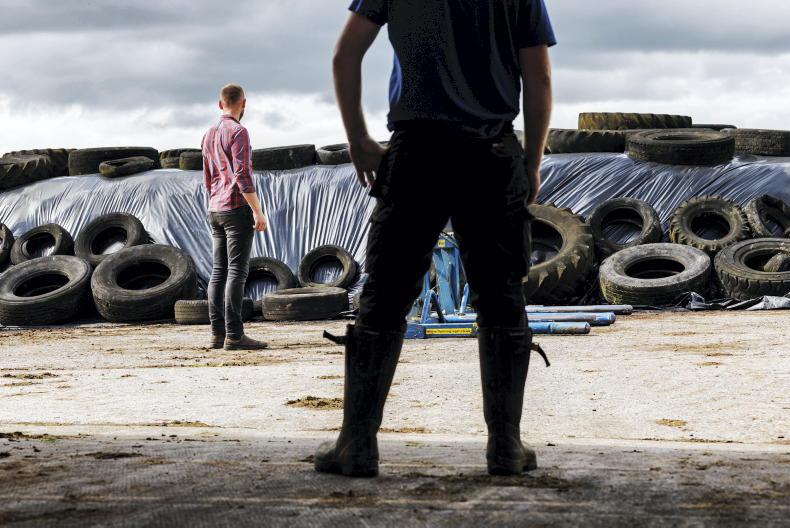The dark cloud of mental illness can, as time goes by, grow bigger and darker – settling over the heads of a person’s family, as our letter from Mary on page 11 clearly shows. It brings stress and worry, and this feeling is intensified by the financial implications of the situation.
However, whether it’s emotional support or financial assistance, it is important for Mary to realise there is help out there. Irish Country Living reached out to Teagasc, IFAC and the IFA to understand what supports are available as well as looking at suitable health insurance and income protection policies.
Steady Income
IFAC acknowledges that, until now, Mary has been doing her best keeping the farm going. John Donoghue says: “Accessing support to look after the animals to ensure the farm continues to receive income is key here. If the animals or their products are saleable at least the income for the household can be protected, and a relatively normal financial life can continue.
“Mary doesn’t mention any plans for the farm, but it is best not to take on unnecessary additional projects or capital developments. Also reduce stock to manageable levels, but get tax advice before making any big decisions,” John advises.
“Given milk prices, though, we do acknowledge that it is becoming very difficult for Mary to pay contractors. Furthermore, it appears from her letter that John’s mental health problems have been going on a while. It may not be today, it may not be tomorrow but sometime in the future, some tough decisions might need to be considered and medical advice is key here,” he explains.
Leasing Option
If this is something Mary is considering, it would be worth contacting Teagasc. A spokesperson says: “In cases like this, an analysis needs to be completed in relation to the future of the farm unit in both the short and the long term.
The viability of using hired labour long term is an issue and will depend on the scale and efficiency of the farm enterprise. A Teagasc advisor will be able to help Mary to assess how long-term this solution is.
“The next step is to look at the possibility of partnership options where some of the pressure of running the farm is lessened. Alternatively, the solution may be to simplify the farming system,” says the advisor.
John from IFAC adds: “If you reach this stage, it is essential tax advice is sought before any major business, stock or land ownership/leasing decisions are made. If the family isn’t going to be able to sustain and manage a farm business, favourable tax incentives are available for long-term leasing.”
Throughout all of this, it’s important to have a transparent relationship with your bank. If this seems a bit overwhelming, the IFA offers assistance to farmers who are facing credit difficulties, whether due to short-term cash-flow pressures, or longer-term issues. They assist in your engagement with the banks and other creditors, if necessary.
Health Insurance
When it comes to health insurance, Mary says: “We have all sorts of policies, but mental health is not covered in any of them, I am told.”
Unfortunately, coverage is not ideal in this respect. Mental health is broad and diverse, and finding the right diagnosis, treatment, medication and counselling is a long process and very unpredictable in nature. Hence, health insurance providers won’t take the risk.
Saying that, some coverage is often necessary. The public sector is, to say the least, flawed in regards to mental health services and while you won’t get a huge amount from health insurance companies, it is better than nothing and can bring you further down the line in terms of accessing services.
Dermot Goode of Total Health Cover says: “Mary’s family has health insurance, so those costs are already factored into the family’s financial outgoings, but the real question is: does her husband have the right policy?
“Although coverage for mental health is not ideal, the corporate health insurance policies, which anybody can access, cover 100 nights a year in private psychiatric facilities, which include Saint John of God and St Patrick’s University Hospital,” says Dermot.
These policies include:
• VHI – Company Plan Plus Level 1.3: €1,132.• GloHealth – Best Smart: €1,162.• Laya – Simply Connect Plus: €1,169• Irish Life Health – Health Plan 16.1: €1,218“Unfortunately, though, if like John you have a pre-existing condition, you have a waiting period of five years before this specific issue is covered.
“Once you are on the plan and have waited that time period, though, you will always be covered by those benefits. It certainly seems that John’s issue is ongoing and has been for a while. Five years might seem very far away now, but it is a policy that will benefit him for the rest of his life,” he explains.
Dermot adds: “If John and Mary do decide to change policies, it is important to be transparent with the health insurance company of choice, informing them of the exact treatment that is currently underway, the doctor he is attending, etc to ensure it is covered.”
Income Protection
As Mary says, only for her off-farm job, she really doesn’t know what the family would have done. But what cover is in place to protect this income? There is so much emphasis on her husband, but where would the family be if something happened Mary?
David O’Neill of Thomond Asset Management says if this coverage is not in place, it is something that needs to be sorted sooner rather than later. “Mary works in an administrative role, but as she is on the road some days, her job would be considered Class 2. As Mary has no health problems, she should have no issues obtaining income protection.
“The most competitive quote obtained was through Aviva Life & Pensions. Their Personal Income Protection Policy costs €200.63 per month and will offer an annual benefit of €23,974 until age 65.
pre-existing conditions
“Unfortunately, due to John’s pre-existing mental health issue, he would be declined income protection, so while this portion of the advice does not benefit Mary, it may be of use to other families,” explains David.
“Mental health issues are covered under an income protection policy. If John had taken out income protection before he started having mental health issues, he would have been covered for any time off he did have to take due to this illness.
“This would have been a huge relief to Mary and her family and would have eased the burden in regards to paying for help on the farm. Up until recently, due to the nature of the job, farmers couldn’t obtain income protection. However, since 2013, they can.
According to David: “Only two companies offer income protection for farmers.” These are:
• Aviva: €350.55 per month. Will cover an annual benefit of €37,500.• Royal London: €507.08 per month. Will cover an annual benefit of €37,500.However:• New Ireland, Friends First and Irish Life do not offer income protection for farmers.• Tax relief of 40% is applicable.David says: “Aviva is over €150 cheaper per month because farmers fall into the Class 3 category, while Royal London positions it in the more expensive Class 4 category. It is hoped that in the future, the other three companies will come onboard, offering more competition in the area.” CL
The dark cloud of mental illness can, as time goes by, grow bigger and darker – settling over the heads of a person’s family, as our letter from Mary on page 11 clearly shows. It brings stress and worry, and this feeling is intensified by the financial implications of the situation.
However, whether it’s emotional support or financial assistance, it is important for Mary to realise there is help out there. Irish Country Living reached out to Teagasc, IFAC and the IFA to understand what supports are available as well as looking at suitable health insurance and income protection policies.
Steady Income
IFAC acknowledges that, until now, Mary has been doing her best keeping the farm going. John Donoghue says: “Accessing support to look after the animals to ensure the farm continues to receive income is key here. If the animals or their products are saleable at least the income for the household can be protected, and a relatively normal financial life can continue.
“Mary doesn’t mention any plans for the farm, but it is best not to take on unnecessary additional projects or capital developments. Also reduce stock to manageable levels, but get tax advice before making any big decisions,” John advises.
“Given milk prices, though, we do acknowledge that it is becoming very difficult for Mary to pay contractors. Furthermore, it appears from her letter that John’s mental health problems have been going on a while. It may not be today, it may not be tomorrow but sometime in the future, some tough decisions might need to be considered and medical advice is key here,” he explains.
Leasing Option
If this is something Mary is considering, it would be worth contacting Teagasc. A spokesperson says: “In cases like this, an analysis needs to be completed in relation to the future of the farm unit in both the short and the long term.
The viability of using hired labour long term is an issue and will depend on the scale and efficiency of the farm enterprise. A Teagasc advisor will be able to help Mary to assess how long-term this solution is.
“The next step is to look at the possibility of partnership options where some of the pressure of running the farm is lessened. Alternatively, the solution may be to simplify the farming system,” says the advisor.
John from IFAC adds: “If you reach this stage, it is essential tax advice is sought before any major business, stock or land ownership/leasing decisions are made. If the family isn’t going to be able to sustain and manage a farm business, favourable tax incentives are available for long-term leasing.”
Throughout all of this, it’s important to have a transparent relationship with your bank. If this seems a bit overwhelming, the IFA offers assistance to farmers who are facing credit difficulties, whether due to short-term cash-flow pressures, or longer-term issues. They assist in your engagement with the banks and other creditors, if necessary.
Health Insurance
When it comes to health insurance, Mary says: “We have all sorts of policies, but mental health is not covered in any of them, I am told.”
Unfortunately, coverage is not ideal in this respect. Mental health is broad and diverse, and finding the right diagnosis, treatment, medication and counselling is a long process and very unpredictable in nature. Hence, health insurance providers won’t take the risk.
Saying that, some coverage is often necessary. The public sector is, to say the least, flawed in regards to mental health services and while you won’t get a huge amount from health insurance companies, it is better than nothing and can bring you further down the line in terms of accessing services.
Dermot Goode of Total Health Cover says: “Mary’s family has health insurance, so those costs are already factored into the family’s financial outgoings, but the real question is: does her husband have the right policy?
“Although coverage for mental health is not ideal, the corporate health insurance policies, which anybody can access, cover 100 nights a year in private psychiatric facilities, which include Saint John of God and St Patrick’s University Hospital,” says Dermot.
These policies include:
• VHI – Company Plan Plus Level 1.3: €1,132.• GloHealth – Best Smart: €1,162.• Laya – Simply Connect Plus: €1,169• Irish Life Health – Health Plan 16.1: €1,218“Unfortunately, though, if like John you have a pre-existing condition, you have a waiting period of five years before this specific issue is covered.
“Once you are on the plan and have waited that time period, though, you will always be covered by those benefits. It certainly seems that John’s issue is ongoing and has been for a while. Five years might seem very far away now, but it is a policy that will benefit him for the rest of his life,” he explains.
Dermot adds: “If John and Mary do decide to change policies, it is important to be transparent with the health insurance company of choice, informing them of the exact treatment that is currently underway, the doctor he is attending, etc to ensure it is covered.”
Income Protection
As Mary says, only for her off-farm job, she really doesn’t know what the family would have done. But what cover is in place to protect this income? There is so much emphasis on her husband, but where would the family be if something happened Mary?
David O’Neill of Thomond Asset Management says if this coverage is not in place, it is something that needs to be sorted sooner rather than later. “Mary works in an administrative role, but as she is on the road some days, her job would be considered Class 2. As Mary has no health problems, she should have no issues obtaining income protection.
“The most competitive quote obtained was through Aviva Life & Pensions. Their Personal Income Protection Policy costs €200.63 per month and will offer an annual benefit of €23,974 until age 65.
pre-existing conditions
“Unfortunately, due to John’s pre-existing mental health issue, he would be declined income protection, so while this portion of the advice does not benefit Mary, it may be of use to other families,” explains David.
“Mental health issues are covered under an income protection policy. If John had taken out income protection before he started having mental health issues, he would have been covered for any time off he did have to take due to this illness.
“This would have been a huge relief to Mary and her family and would have eased the burden in regards to paying for help on the farm. Up until recently, due to the nature of the job, farmers couldn’t obtain income protection. However, since 2013, they can.
According to David: “Only two companies offer income protection for farmers.” These are:
• Aviva: €350.55 per month. Will cover an annual benefit of €37,500.• Royal London: €507.08 per month. Will cover an annual benefit of €37,500.However:• New Ireland, Friends First and Irish Life do not offer income protection for farmers.• Tax relief of 40% is applicable.David says: “Aviva is over €150 cheaper per month because farmers fall into the Class 3 category, while Royal London positions it in the more expensive Class 4 category. It is hoped that in the future, the other three companies will come onboard, offering more competition in the area.” CL









SHARING OPTIONS